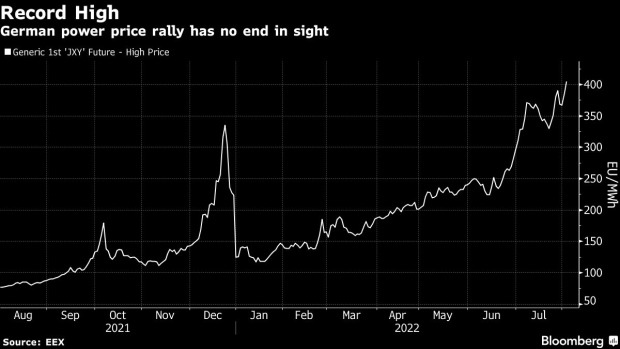Frankfurt August 3 2022: Difficult summer conditions including extreme heat and drought drove European electricity prices to new highs on Tuesday, flashing a warning of an even more challenging winter.
Rivers too warm to be used for cooling nuclear plants in France and water levels too low to ship coal to power stations along the Rhine are crimping European supplies of electricity. That means that countries are relying even more on gas to meet extra power demand instead of siphoning off the fuel into storage ahead of winter.
Electricity plants undergo maintenance shutdowns during the summer months when demand falls, but it’s not so simple this year due to extreme weather conditions. With Europe desperately short of gas, every bit of available generation capacity is valuable.
The tight conditions are pushing benchmark electricity prices beyond levels ever seen even in winter as most of Europe grapples with drought and extreme heat. A further reduction in Russian flows to the continent would make the situation even worse.
“There have been a lot of risks for Europe securing adequate fuel supplies ahead of winter,” said Natalie Biggs, global head of thermal-coal markets at energy consulting firm Wood Mackenzie. Gas is potentially an unreliable source of energy if Russia makes further supply cuts, while low water levels along the Rhine represent a risk for coal, she said.
Europe Power Prices Set to Climb Even Higher After Record Month
France is facing soaring temperatures again this week, after registering the driest July on record. The weather conditions have led to forest fires on the country’s west coast and hit the nation’s farmers, hampering the key flowering period for corn fields. Hydro levels are 17% below the average level of the past four years, according to RTE data.
Temperatures are expected to peak at about 40 degrees Celsius (104 degrees Fahrenheit) in the south of the France on Wednesday. The heat also pushes up river temperatures, threatening France’s ability to cool its already strained nuclear power plants. France is usually a power exporter, but its atomic output — which accounted for 69% of the country’s electricity production in 2021 — is set to fall to the lowest in more than three decades this year and won’t fully recover in 2023.
German power for next year advanced as much as 5.4% to a record 405 euros ($414.56) per megawatt-hour on the European Energy Exchange AG, before trimming gains. Equivalent contracts for French power also rose to a record, advancing as much as 2.8% to 522 euros. In shorter-term markets, month-ahead prices in both Germany and France also advanced, gaining as much as 4.2% and 1.5%, respectively.










